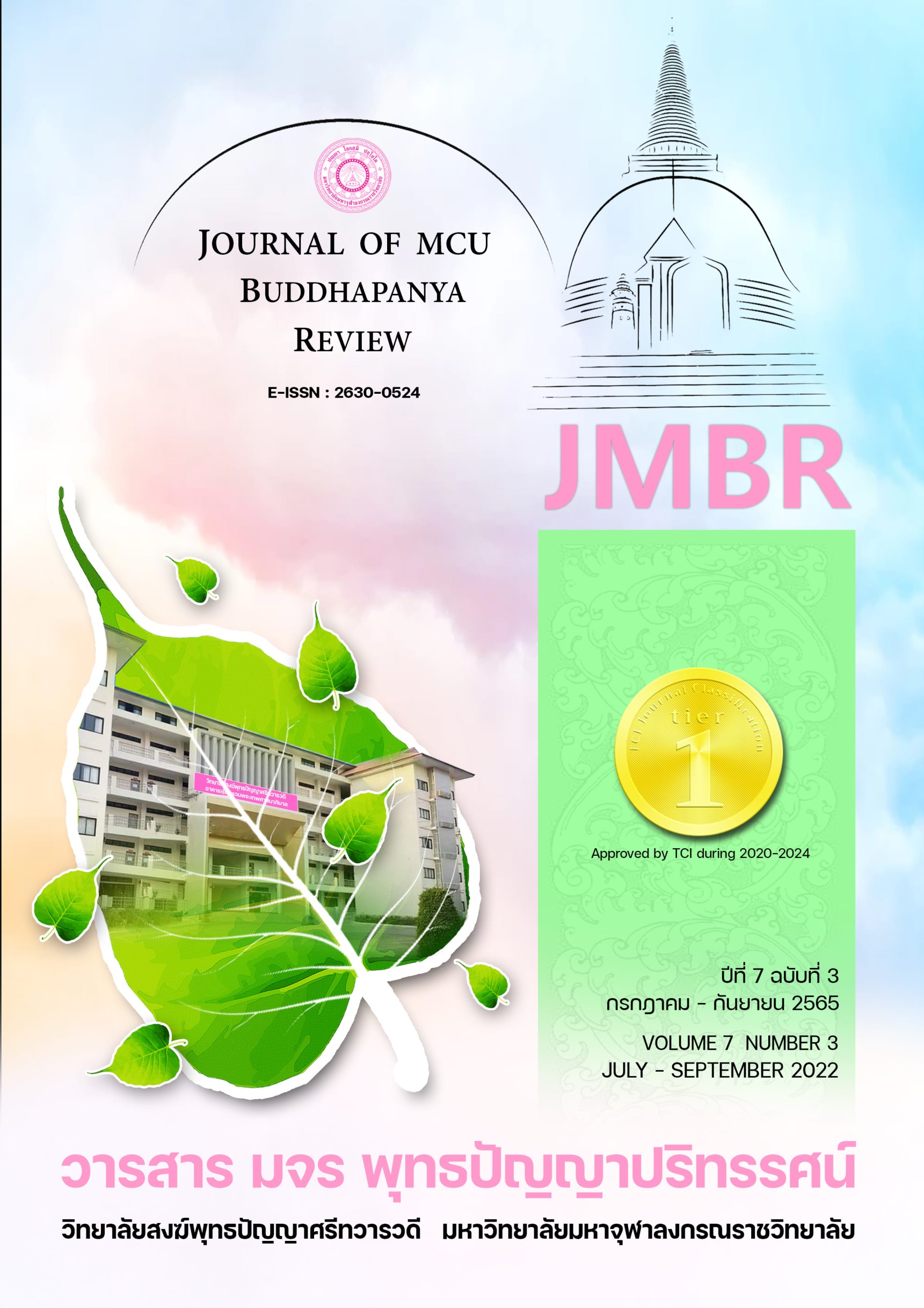การพัฒนาคุณภาพชีวิตเพื่อความมั่นคงของชุมชนตามหลักมัชฌิมาปฏิปทา
คำสำคัญ:
การพัฒนาคุณภาพชีวิต, ความมั่นคง, หลักมัชฌิมาปฏิปทาบทคัดย่อ
บทความวิชาการนี้มุ่งศึกษา การพัฒนาคุณภาพชีวิตเพื่อความมั่นคงของชุมชนตามหลักมัชฌิมาปฏิปทา พบว่า การพัฒนาประเทศมีจุดเน้นที่การเจริญเติบโตทางเศรษฐกิจ เน้นความก้าวหน้าทางเทคโนโลยี การมีสิ่งอำนวยความสะดวกที่มีความสะดวก รวมถึงระบบการสื่อสารที่ทันสมัย จึงทำให้เกิดการติดต่อสัมพันธ์กันมากขึ้น การพัฒนาเศรษฐกิจและสังคมของประเทศให้มีความเจริญก้าวหน้า มีความมั่นคง และยั่งยืนได้นั้น ต้องอาศัยรากฐานของชุมชนที่เข็มแข็ง ชุมชนมีความมั่นคง อยู่แบบพอประมาณ ในพระพุทธศาสนาสอนให้มักน้อย สันโดษ และมีความพอเพียง พอดี ตามหลักมัชฌิมาปฏิปทา คือ ทางสายกลาง หมายถึง การไม่ยึดถือสุดโต่งของทางทั้ง 2 ได้แก่ อัตตกิลมถานุโยค คือ การประกอบตนเองให้ลำบากเกินไป กามสุขัลลิกานุโยค คือ การพัวพันในกามในความสบาย กล่าวอีกนัยหนึ่งก็คือ การเดินตามแนวทางปรัชญาเศรษฐกิจพอเพียง กล่าวคือ การรู้จักประมาณตน อยู่แบบพอเพียง พอใจในปัจจัยที่ตนหามาได้ เนื่องจากคนในสังคมจะคำนึงถึงการมีอยู่อย่างจำกัดของทรัพยากรต่าง ๆ ที่เกิดขึ้นตามธรรมชาติ และพยายามช่วยกันจัดสรร จัดการทรัพยากรเหล่านั้นอย่างถูกต้อง เป็นธรรม คำนึงถึงอนุชนผู้เป็นทรัพยากรมนุษย์ที่กำลังเติบโตขึ้นมาบริโภคทรัพยากรเหล่านี้ในอนาคตต่อไป
เอกสารอ้างอิง
Aphicha Porncharoenkitkul. (2021). Quality of life of citizens of state welfare card holders, a case study of Don Tum District, Nakhon Pathom Province. MCU Buddhapanyaparitas Journal. 6(2), 120-131.
Chamnong Adiwatanasit (1991) Religion, Life and Society. Bangkok: Mental Health Publishing.
Chanon Chaithongdee et al. (2009). An Analysis of Isan Literature on the World of Dharma Cases. Maha Sarakham Rajabhat University Journal; M.R.M. 3(2), 21-31.
Charan Chanthalakhana. (2006). Philosophy of Sufficiency Economy and Public Happiness and Sustainable Pollen. Bangkok: Sukhothai Thammathirat Open University.
Charan Chanthalakkhana. (2006). Folk fisheries way of Wonnapha Beach in the context of urban society. Southern Technology Journal. 11(1), 95-104.
Entertainment Pawichit. (2006). Thai traditions, culture and beliefs. Bangkok: Odeon Store.
His Majesty King Bhumibol Adulyadej. (2009). The Word of the Father Son : Collection of His Majesty's Royal Speech. and Royal Speech on Sufficiency Economy / Phra Dabos. Foundation 8th printing. Bangkok: Bangkok Printing Press.
Kamjai Khamwiset and Teetat Trisiricho. (2019). Management of Thai Investors Investment Promotion of the Office of the Board of Investment using the Sufficiency Economy Philosophy. MCU Journal of Social Sciences Periscope. 8(4), 226-239.
Mahachulalongkornrajavidyalaya University. (1996). Thai version of the Tripitaka. Bangkok: Mahachulalongkornrajavidyalaya University.
Nirand Suthi Nirand. (2015). Organizational Education of learning by using the method of promotion according to the sufficiency economy philosophy of educational institution administrators under the Bangkok Metropolitan Administration. Parichart Journal Thaksin University. 28(1), 156-173.
Pathompong Phoprasitnan. (2007). History of Buddhism in Thailand from the Sukhothai period to the reign of King Rama V. Bangkok: Mahidol University.
Phra Kru Suphat Wachiranukul and Yueng Pannengphet. (2021). COVID-2019 : Opportunities and methods of self-improvement according to Buddhism. Journal of the University of Buddhism. 6(2), 213-221.
Phrakhru Niphat Kanlayanawat (Kanong Kalyanathammo) and Phrasornsophon Paphassaro. (2019). Development of Sustainable Education according to Buddhism. graduate study periscope Nakhon Sawan Sangha College. 7(2), 291-316.
Piyabutr Lokrailert. (2007). Sufficiency Economy. Bangkok: Mac printing house.
Prawet Wasi. (1998). Sub-district community : strategy for sufficiency economy. Morality and health. Bangkok: Matichon Publishing House.
Royal Academy. (2003). Dictionary of the Royal Institute, 1999. Edition 5. Bangkok: Nammeebooks Publications Co., Ltd.
Saowanat Leklersin and Krailas Luechai. (2017). The role of communication of community leaders towards building a knowledge base. Sufficiency Economy in Pa Daet District Chiang Rai Province. Journal of Siam Paritas Communication. 16(21), 147-156.
Sasitorn Manaswarakul. (2011). Level of application of the sufficiency economy of the production system. and management of community enterprises in Chiang Rai Province. Journal of Management Science Chiang Rai Rajabhat University. 6(2), 47-67.
Somchit Thongyu. (2006). Social Psychology. 3rd printing, Bangkok: Chivapiwat printing house.
Sonthaya Ponsri. (2002). Principles of Sociology. Bangkok: Odeon Store Publishing House.
Sumet Tantivejkul, Dr. (2001). Under the Royal Palace. Bangkok: Matichon Publishing House.
Warakorn Poolsawat et al. (2019). Community development based on the concept of the Middle Way of Confucius. Journal of the University of Buddhism. 4(3), 489-504.
Wirunsiri Jaima and Praphaphan Chaiyanon. (2017). The model of participatory management according to the Sufficiency Economy Philosophy of Chrysanthemum Farmers Group of the Sa-Go Royal Project Development Center. Chiang Rai Province. Journal of Management Science Chiang Rai Rajabhat University. 12(1), 91-116.
ดาวน์โหลด
เผยแพร่แล้ว
รูปแบบการอ้างอิง
ฉบับ
ประเภทบทความ
สัญญาอนุญาต
ลิขสิทธิ์ (c) 2022 วารสาร มจร พุทธปัญญาปริทรรศน์

อนุญาตภายใต้เงื่อนไข Creative Commons Attribution-NonCommercial-NoDerivatives 4.0 International License.



